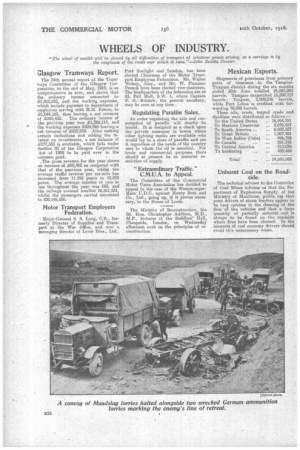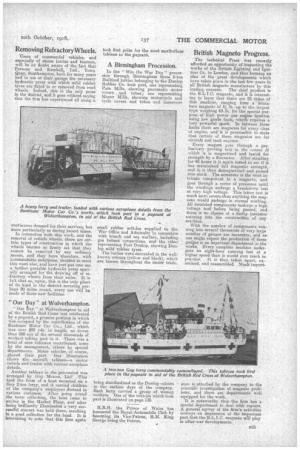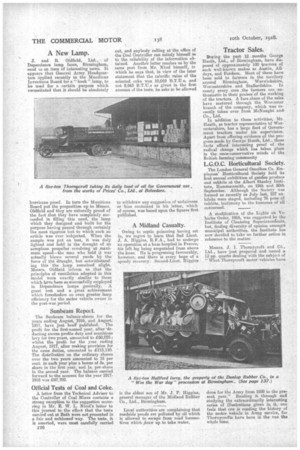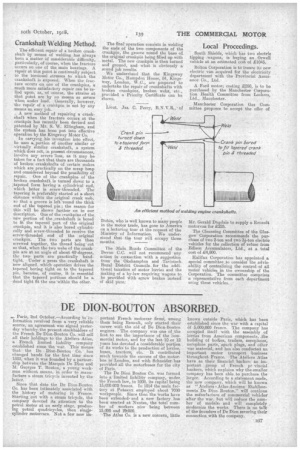WHEELS OF INDUSTRY.
Page 4

Page 5

Page 6

Page 7

If you've noticed an error in this article please click here to report it so we can fix it.
"The wheel of wealth will be slowed by all difficulties of transpOrt at whatever points arising, as a carriage is by the roughness of the roads over which it runs."—John Beattie Crozier. '
Glasgow Tramways Report.
The 24th annual report of the Tramways Committee of the Glasgow Corporation, to the end of May, 1918, is as comprehensive as ever, and shows that the ordinary income amounted to £1,412,635, and the working expenses, which include payment to dependants of employees serving with H.M. Forces, to £1,044,183, thus leaving a net revenue of £368,452. The ordinary income of the previous year was £1,260,115, and
4 the working expenses £838,065 leaving a, net revenue of £422,050. After making certain deductions and adding the interest on investments, a net balance of £177,553 is available, which falls under Section 30 of the Glasgow Corporation Act of 1909 to be paid over to the common good.
The gross revenue for the year shows an increase of £82,462 as compared with that of the previous year, whilst the average traffic revenue per car-mile has increased from 11.592 pence to 12.832 pence. The average number of cars in use throughout the year was 68.5, and the mileage covered totalled 26,261,231, whilst the passengers carried amounted to 430,946,566.
Motor Transport Employers Federation.
Major-General S. S. Long, C.B., formerly Director of Supplies and Transport at the War Office, and now a managing director of Lever Bros., Ltd.. Port Sunlight and London, has been elected Chairman of the Motor Trans it Employers Federation. Mr. Walter olsey, Junx., and Mr. W. Flaxman French have boon elected vice-chairmen. The headquarters of the federation are at 83, Pall Mall, S.W. 1, where Captain F. 0.`Bristow, the general 'secretary, may be seen at any time.
Regulating Paraffin Sales.
An order regulating the sale and consumption of paraffin will shortly be issued. It is designed as a check upon the private consumer in towns where other lighting media are available who would lay in a store of paraffin and use it regardless of the needs of the country user to whom the oil is essential. For trade and commercial purposes there should at present be no material restriction of supply.
"Extraordinary Traffic." C.M.U.A. to Appeal.
The Committee of the Commercial Motor Users Association has decided to appeal in the case of the Weston-superMare U.D.C.• against Henry Butt and Co., Ltd., going up, if it proves necessary, to the House of Lords.
The Minister of Reconstruction, the Rt. Hon. Christopher Addison, M.D., MP., lectures at the Saddler? Hall, Cheapside, London, on Wednesday afternoon next on the principles of reconstruction.
Mexican Exports.
Shipments of petroleum from primary ports of clearance in the Tampico-. Tuxpam district during the six months ended 30th June totalled 24,885,993 barrels. Tanipico despatched 16,598,717 barrels; Tuxpam, 8,209,276 barrels, while Port Lobos is credited with forwarding 78,000 barrels.
'these oils, crude, topped crude and distillate were distributed as follows:— Unburnt Coal on the Road side.
The technical adviser to the Controller of Coal Mines informs us that the Department of Explosives Supply, of the Ministry of Munitions, points mkt that some drivers of steam tractorsappear to be very careless in the cleaning of the fires of the vehicles and that a large quantity of partially unburrit coal is always to be found on the roadside where fires have been cleaned. In the interests of coal economy drivers should avoid th;s unnecessary waste.
Removing RefractoryWheels.
Users of commercial vehicles, and especially of steam lorries and tractors, will be no doubt aware of the fact that Parsons and Kemball, Ltd., Town Quay, Southampton, have for many years had in use at their garage the necessary hydraulic press with which solid rubber tyres are fitted to or removed from road wheels. Indeed, this is the only press' in the district, and it goes without saying that the firm has experienced all along a continuous demand for their services, but more particularly so during recent times.
In connection with this work, and the removal of vehicle wheels, there are certain types of construction in which the wheels become so firmly set that they cannot be removed by any ordinary means, and they have therefore, with• commendable enterprise, decided to meet this want also, and have just put into use a further portable hydraulic press specially arranged for the drawing off of refractory wheels from their axles. It is felt that as, again, this is the only plant of its kind in the district covering perhaps 20 miles round, every use will be made of these new facilities.
"Our Day" at Wolverhampton.
" Our bay" at Wolverhampton in aid of the British Red Cross was celebrated by a pageant, a premier position in which was occupied by the contribution of the Sunbeam Motor Car Co., Ltd., which was over 200 yds_ in length, no fewer than 500 out of the several thousands of workers taking part in it,. There was a total of nine tableaux contributed, some by the management, others by special departments. Motor vehicles, of course, played their part. Our illustration shows the aircraft tableau—a motor vehicle and trailer with various aeroplane details.
Another tableau in the processiori was arranged by Guy Motors, Ltd: This took the form of a boat mounted on a Guy 2-ton lorry, and it carried children of the company's employees dressed in various costumes. After going round • the town collecting, the boat came to anchor in the Market Place, and after being brilliantly illuminated a very successful concert was held there, resulting in a good collection for the fund. It is interesting to note that this firm again took first prize for the most meritorious tableau in the pageant.
A Birmingham Procession.
In the "Win the War Day" procession through Birmingham three 5-ton Ilallford lorries belonging to the Dunlop Rubber Co. took part, one representing Para Mills, showing pneumatic motor covers and tubes; one representing Manor Mills, showing motorcycle and cycle covers and tubes and numerous small rubber articles supplied to the War Office and Admiralty in connection with trench and sea warfare, including gas helmet connections, and the other representing Fort Dunlop, showing Dunlop solid rubber tyres. The lorries were decorated in the wellknown colour a (yellow and black), which Aire known throughout the motor trade.
being standardized as the Dunlop colours in the earliest days of the company. Each lorry carried a group of women workers. One of the vehicles which took part is illustrated on page 138. .
H.R.II. the Prince of Wales has honoured the Royal Automobile Club by becoming its Vice-Patron, E.M. King George being the Patron.
British Magneto Progress.
The technical Press was recer.tly, afforded an opportunity of inspecting the works of the British Lighting and Ignition Co. in London, and thus forming an idea of the great developments which have taken place in the last few years in all British magneto manufacture by this leading concern. The chief product is the B.L.I.C. magneto, and it is interesting to learn that there arc 25 types of this 'machine, ranging from a minia ture magneto of 5 lb.• up to the largest type weighing 63 lb. for the special pur
pose of high power gas engine ,ignition
using low grade fuels, which requires a very powerful spark. In between these
limits there are magnetos for every class of engine, and it is permissible to state that certain of these magnetos are for aircraft and tank engines.
Every magnet goes through a preliminary proving t.eti in the course df which it is magnetized and tested for strength by a fluxmeter. After standing for 48 hours it is again tested to see if it • has maintained full magnetic strength, • and it is then demagnetized and passed into stock. The armature is the most-in tricate component in a magneto, and goes through a series of processes until the windings undergo a breakdown test at very high voltage. This latter test is much more severe than anything the magneto would undergo in normal working.
All insulated components undergo a high voltage test before being passed, and there is no chance of a faulty insulator entering into the construction of any machine.
With the number of components running into several thousands of very large number of gauges are necessary, and as one might expect .the production of these
i gauges s an important department in the works. Every complete machine undergoes an eight-hour running test at a higher speedthan it would ever reach in practice. It is then taken apart, examined, and reassembled. Much' import ance is attached by the company to the scientific investigation of magneto problems, and there are departments well equipped for the work. It is noteworthy that the firm has a special department to deal with repairs. A general survey of the firm's activities conveys an impression of the important part that the B.L.I.C. magneto will play in after-war developments..
A New Lamp.
J. and R. Oldfield, Ltd., of Dependence lamp fame, Birmingham, send us an item of interesting news. It appears that General Army Headquarters applied recently to the Munitions Inventions Board for a " hush " lamp, to be used for a certain purpose which necessitated that it should be absolutely hurricane proof. In turn the Munitions Board put the proposition up to Messrs. Oldfield and they are naturally proud of the fact that they have completely succeeded in filling this need, the lamp which they designed and built for the purpose having passed through certainly the most rigorous test to which such an article was ever 'subjected. When the sample was put on test, it was duly lighted and held in the draught of an aeroplane propeller revolving at maximum speed—the man who held it was actually blown several yards by the force of the draught, but notwithstanding this the lamp remained alight. Messrs. Oldfield inform us Abet the principles of ventilation adopted in this model were exactly similar to those which have been so successfully employed in Dependence lamps generally. A great test and a great achievement which foreshadow an even greater lamp efficiency for the motor vehicle owner in the post-war period.
Sunbeam Repoit.
The Sunbeam balance-sheets for the years ending August, 1916, and August; 1917, have just beet published. The profit for the first-named year, after-deducting excess profits duty and munitions levy for two years, amounted to £50,025; whilst the profit for the year ending August., 1917, after making provision for the same duties, amounted to £115,110. The distribution on the ordinary shares over the two years amounted to 15 per cent, in each year plus a bonus of 3s. per share in the first year, and is. per.share in the second year. The balance carried forward to-the account for the year 19171918 was £97,702.
Official Tests of Coal and Coke.
A letter from the Technical Adviser to the Controller of Coal Mines contains a strong exception to the suggestion occurring in Mr. E. W. L. Nicol's letter to this journal to the effect that the tests cart ied out at Bath were not presented in a fair and unbiassed way. The tests, it is asserted, were most carefully carried out, and anybody calling at the office of the Coal Controller can satisfy himself as to the reliability of the information obtained. Another letter reaches us by the same post from Mr. Nicol himself, in which he says that, in view of the later statement that the calorific value of the selected coke was 10,019 B.T.U.s, and not 8,663 B.T.1.1.s as given in the first account of the tests, he asks to be allowed to withdraw any suggestion of unfairness or bias contained in his letter, which of course, was based upon the figures first published.
_ A Midland Casualty.
Owing to septic poisoning having set in, we regret to learn that 2nd Lieut. J. A. Higgins, R.F.A., had to undergo an operation at a base hospital in France, his left leg being amputated from above the knee. He is progressing favourably, however, and there is every hope of a speedy recovery.Second-Lieut. Higgins
is the eldest eon of Mr. .T. P. Higgins, general manager of the Midland Rubber Co., Ltd., Birmingham.
road authorities are complaining that roadside ponds are polluted by oil which is allowed to escape from road locomotives which draw up to take water.
Tractor Sales.
During the past 12 . months George Heath, Ltd., of Birmingham, have disposed of approximately 100 tractors of such well-known makes as Austin, All. days, and Fordsou. Most of these have been sold to farmers in the territory around Birmingham, Warwickshire, Worcestershire and Staffordshire. In nearly every case the farmers are enthusiastic in their praises of the working of the tractors. A fare share of the sales have matured through the Worcester branch of the company, which was recently taken over from McNaught andCo., Ltd.
In addition to these activities' Mr. Heath, as tractor representative Of Worcestershire, has a large fleet of Government tractors under his supervision. Apart from offering evidence of the progress made by George Heath, Ltd., these facts afford interesting proof of the radical change which has taken place in the once-conservative minds of the British farming community
L.G.O.C. Horticultural Society.
The London General Omnibus Co. Employees' Horticultural Society held its first annual exhibition of garden produce and rabbits at the Albert Stanley Institute, Hammersmith, on 19th and 20th September. Although the Society was formed as recently as July last, 527 exhibits were staged, including 76 pens of rabbits, testimony to the keenness of all concerned.
A Modification of the Lights oh Ye'hicles-Order, 1916, was suggested by the Institute of Cleansing Superintendents, but, finding diversity of opinion amongst municipal authorities, the Institute has now decided to take no further action in reference to the matter.
Messrs. J. I. Thornycroft and Co., Ltd., have just prepared and issued a 12 pp. quarto dealing with the subject of 'What Thornycroft motor vehicles have done for the Army from 1899 to the present year." Reading it through and studying the extraordinarily interesting series of illustrations given in it, one feels that one is reading the history of the motor vehicle in Army service, for Thornycrofts have been in the van the whole time.
Crankshaft Welding Method.
The efficient repair of a broken crankshaft, by means of welding has always been a matter of considerable difficulty, particularly, of course, when the fracture occurs on one of the main bearings. A repair at this point is continually subject
• to the torsional stresses to which -the crankshaft is exposed. When the fracture OCCULTS on one of the crankpins, a much more satisfactory repair can be relied upon, as, of course, the strains at that point are by no means so severe when under load. Generally, however, the repair of a crankpin is not by any means au easy job.
. A new method of repairing a crankshaft when the fracture occurs at the crankpin has recently been devised and Patented by Mr. S. W. Effingham, and the system has been put into effective operation by the Kingsway Motor Co.
In carrying his -invention into effect, he uses a. portion of another similar or virtually similar crankshaft, a system which does nit, in present circumstances, involve any severe loss, as it may be taken for a fact that there are thousands of broken crankshafts of certain makes which are practically on the scrap heap and considered beyond the possibility of repair. One of the crankpins of the broken crankshaft is turned down to a . Itapered form having a cylindrical end, which latter is screw-threaded. The tapering is preferably started at a short distance within the original crank web, so that a groove is left round the thick end of the tapered pin; • the reason for this will be shown further on in our description. One of the 'crankpins of the new portion of the crankshaft. is bored to fit the tapered part of the original crankpin, and it is also bored cylindrically and screw-threaded to receive the screw-threaded end of the original crankpin. The two parts are then screwed together, the thread beingcut so that, when the two webs of the crankpin are at an angle of about 40 degrees, the two parts are practically handtight. Under a press the crankshaft is now aligned, which operation drives the tapered boring tight on to the tapered pin, because, of course, it is essential that the tapered portions should be a dead tight fit the one within the other.
The final' operation tonsists in welding the ends of the two components of the crankpin, the groove round the base of. the original crankpin being filled up with metal. The new crankpin is then turned and ground, and what is obviously a sound job results. We understand that the Kingsway Motor Co., Hampden House, 84, Kingsway, London, W.C., are prepared to undertake the repair of crankshafts with broken crankpins', broken web, etc., provided a Priority Certificate can be shown.
'Lieut. Jas. C. Percy, R.N.V.R.,•
Dubin, who is well known to many people in the motor trade, has gone to America on a lecturing tour at the request of the Ministry of Information. We understand that the tour will occupy three months.
The Main Roads Committed of the Devon C.C. will not recommend any action in connection with a suggestion from the Okehampton and Tavistock Rural District Councils for the additional taxation of motor lorries and the Making of a by-law requiring wagons to be provided With mew brakes instead of skid pans:
Local Proceedings.
South Shields, which has two electric tipping wagons, is buying an Orwell vehicle at an estimated cost of £1045.
Bolton Corporation is to insure its new electric van acquired fox the electricity department with the Provincial Assurance Co., Ltd.
A Ford motors costing £250, is to be purchased by the Manchester Corporation Health Committee from Lookers, Ltd., Manchester.
Manchester Corporation Gas Committee proposes to accept the offer of Mr. Gerald DUgdale to supply a Renault motorvan for £225.
The Cleansing Committee of the Glasgow' Corporation recommends the purchase of two 2-tan and two 5k-ton electric vehicles for the collection of refuse from Edison Accumulators, Ltd., at a total cost of £4,800.
Halifax Corporation has appointed a special committee_to consider the advisability of centralizing the control of all motor vehicles in the ownership of the Corporation. The committee comprises a representative from each department using these vehicles.






















